Birth
Caroline was born on May 24, 1845.
Marriage
Caroline married Austin Owen Furst on December 17, 1878. She was his second wife.
Children
Caroline had four children.
- Jane Watson Furst, born October 11, 1879; died January 21, 1934, in Lock Haven, PA. On September 5, 1906, she married John Curtin who was born March 11, 1879, and died April 17, 1956, son of Harry Roland Curtin and Eliza McMeen. They had five children: John Curtin, Jr., born June 14, 1907; William Chamberlin Curtin, born October 11, 1911; Carolyn Chamberlin Curtin, born October 15, 1913; Jane Watson Curtin, born March 18, 1918; and Robert Furst Curtin, born June 11, 1921. ••• Jane Watson Curtin married Howard Allan Downey on October 31, 1942, and had three children; Anne Curtin Downey, born December 6, 1943; Howard Allan Downey, Jr., born November 5, 1946; and Thomas Curtin Downey, born March 10, 1952.
- James Chamberlin Furst, born December 1, 1882; married Mary Adele Harrar.
- Walter Benedict Furst, married Edith Whittier
- Edith Barrie Furst, born July 28, 1881; died November 24, 1884, at three years of age.
Biography
This is an autobiography written by Caroline Watson Chamberlin. We have a photocopy of a typewritten copy. Apparently her son Walter asked for this to be written. He passed a copy on to William C. Curtin, who I suppose gave a copy to my side of the family.
Several times you have asked me to write you a little history of my early life and the various organizations in which I was specially interested in later. I will begin by telling you that but few people have ever had a happier childhood.
My father was an influential, prosperous business man. My beautiful mother left nothing undone that would add to the happiness of her children.
Mary Robbins, a little girl Mother took into her home and sent to school. Later she taught in the public school. My first recollection of going to her was one winter morning when ice had formed in a thin white coating on the gutters. I can see the place yet. In company with my little brother we attempted to slide but we soon went through in the mire and slush. When we arrived at the school house, wet and cold, I was laid over Mary’s knees and spanked till the sparks flew.
About this time the Ross Sisters opened a private school for little girls that I attended for several years until the Rev. and Mrs. Marr opened a boarding school for young ladies known as the Milton Seminary. Mary Furst’s mother was one of the young lady scholars and made her home with us while going to school. I was one of the little girls.
Rev. Theodore Wylie, pastor of the United Presbyterian Church, saw the need of a school for both boys and girls. He was instrumental in having an Academy built where boys and girls came from far and near, and boarded in the town and with a fine group of teachers he was not long in establishing quite a reputation. Unfortunately, the building was burned and was never rebuilt.
The parents of the same set of girls (some 10 or 12 of us) decided we were old enough to be sent away to school Birmingham was selected. It was during the Civil War and I shall never forget one evening after supper we gathered on the lawn and listened to the booming of the cannon at Gettysburg. Excitement ran high and we were soon sent to our rooms to pack our trunks. We were to be taken home the next morning. In those days there were no cross cut roads. We were obliged to go to Harrisburg and up the Sunbury and Erie to reach home. Mr. Grier was afraid if the Rebs reached Harrisburg we would be cut off and that seemed to be their mecca. When we arrive there all was confusion. Soldiers lying on the platform, on the side walks, and the street full of them. No trains running on schedule time, all being used to bring soldiers to protect the city. We were obliged to stay all night at the U.S. Hotel. We were fortunate in being able to get two rooms but we did not sleep much. People going through the hall talking excitedly and the fear of the Rebs coming prevented us. Morning came at last and Mr. Grier succeeded in getting us on a train that landed us safely home. I do not remember how long we were home but we were soon sent back to school in the fall.
I suppose you think with the advantages of attending fine schools I should be a brilliant woman but I never took but two prizes, one was a hymn book for reciting the catechism in Sunday School and the other for repeating verses from the Testament, the latter for which I was not entitled. Clara Shearer recited several more than I did but Father was the superintendent and he gave me one just like Clara’s.
When school days were over and I was free, it was a succession of pleasures. Father bought me a horse and I rode and drove to my heart’s content. I visited my school friends and they visited me. We had sleighing parties, picnics, camping parties. I missed nothing.
But there came a time when Father had a succession of financial reverses and for several years before I was married we were comparatively poor. Later however some coal lands were sold. That, with the farm brought us a nice income. After Father’s death, when the land was laid out and sold in town lots I received my portion of which you have all helped me enjoy.
And now comes the busy time in my life that you wanted me to write you and tell you about, the various tings in which I was specially interested. I will begin with my married life where cares and responsibilities multiplied.
To fill a Mother’s place was not an easy task but I soon won the love and confidence of the dear boys, thanks to your Father who was ever ready to advise and encourage me in my undertaking and just here I would like to tell you the secret of my success. I always tried to keep this thought in mind—Would their own Mother approve of what I was doing? When my own children came I made no difference and, oh, how I have been repaid. No mother has ever received more kindness and love from her own children.
The housekeeping was a new experience. In my mother’s home we always had plenty of help and I had never relieved her of the management. All this was new and hard. If we had been starting in a new home it would have been easier. I had some amusing experiences as well as hard ones.
One funny one that just came to me – Biddy the cook was not pleased with my management and soon left. I attempted to bake bread. Mr. Crider had an old German woman cook who was kindness itself to me. I shall never forget her. Many a meal would have been spoiled had it not been for her timely advice. When I attempted to bake she told me that in the morning I should add 4 pints of water to my other ingredients. Instead I added 4 quarts and when ready for the over I had 14 loaves. I shall never forget the smile on your Father’s face when he looked at the table full of bread. He said, “Carrie, you should have put your loaves in pans.” I said, “They are all full and in the oven.” I was not long in telling my good neighbor my troubles and with lots of pans she arrived on the spot and filled her own oven when ready to bake. We had just gotten a case of maple molasses and we managed, with the help of the Rhoades boys, to soon dispose of the entire baking.
The Presbyterians had built a new church on the old site and had built what was called the Wigwam on the corner of Spring and Lamb. There the Sunday school was held until the Chapel on the lot next to the church was finished. I was soon installed as a teacher in the Sunday school, invited to play the matodian, sing in the choir, both of which I declined, (You know why), made president of the Boys Missionary Band (They always ate more cake and ice cream than they had change for the collection.)
Mrs. James Harris was given the class later and I was given the little girls of Jennie’s age. I remember I asked them at the first meeting to suggest a suitable name. Christine Blanchard said she thought “the Busy Spiders” would be a nice name. A vote was taken and all favored the name.
Then came the building of the chapel. Mrs. Margaret Wilson owned by lot adjoining the church. She gave a dinner one evening, inviting a number of the men of the congregation and when they were seated at the table she made known her request. If they would each give 1000 dollars toward a chapel she would give the lot. Mr. Humes, Gov. Curtin, Mr. Blanchard, James Milligan, and A.O. Furst are all the guests present that I can recall. They all agreed and the work began.
I was elected or appointed (I forget which) president of the Society and Mrs. Shugert was Sec. and Treas. We met around at the homes every week when we sold ice cream and cake. Everybody kept cows and all know how to bake good cakes in those days. We gave dinners and suppers, concerts and lectures. I remember a dinner we gave in Bushes store room where he had eight turkeys. I had been to Philadelphia and been entertained at Mrs. Louisa Harrises home. She had a caterer serve the meal. Chicken croquettes were the new dish served. I had Mrs. Harris ask him for the recipe before he left and decided I would use it for the benefit of the chapel the first opportunity—and here was my chance. We all fell to and picked the turkey bones clean. Everybody wanted to learn how to make croquettes. We sent out notices and such a crowd we had for supper. We could have sold as many more. I remember a upper we gave in what was known as Humes Hall where Criders Exchange now stands. Without consulting any of the ladies we decided to give a dinner (or super as they were called in those days). Mrs. Laurie, Mrs. Gov. Curtin, Mrs. Sommerville, Mrs. Blanchard and Miss Marion Milligen were the hostesses who sat at the heads of their long tables. I shall never forget how beautiful they were with their pretty lace caps and handkerchiefs, their cheeks red as roses, their coffee urns in front of them. They brought their best linen and silver and china. Mrs. Johnston, Mrs. Rankin and Mrs. Shorttage always made the coffee. The turkeys were cooked in their homes. The younger ladies waited on the tables. The men of the congregation were just as ready to help as the ladies and in this way we made several thousand dollars. When the chapel was built and finished we went to work to raise money for the organ and new carpet for the church. I tried hard to get some on to take my place but I had done good work and was always re-elected.
Then came the Hospital. Dr. Hayes started a private hospital in his home on Spring Street which soon grew too big for the space allotted to it. The town then decided to buy a property on the out-skirts, where the county hospital now stands. The ministers of the town were asked to appoint from their congregation a woman to serve on the board. Dr. Laurie appointed me from our church. At our first meeting I was elected president although I tried to persuade Mrs. Mitchell to serve who I thought would make a better President. The work was hard. People were not interested. We had no money to carry out our undertakings. The nurses rooms needed furnishing, the kitchen needed more competent help than they had money to pay. We found discouragements at every turn but it did not last long. The Governor relieved us of the burden and people became interested in the good work. The summer we went abroad Mrs. Mitchell was elected in my place.
The D.A.R. was another organization in which I have long been interested. Col. William Ayers of Phila., a friend of the family, wanted me to join the national chapter. He filled out my application papers and sent them to me. Selecting from the Archives David Hammond as the ancestor. Why he did not take Robert Hanna, or Col. Wm. Chamberlin I don’t know. I have always intended to add them to my membership but I think as you have the data collected I will leave the younger generation have the honor.
Mrs. Scott of Lock Haven was Regent of that chapter and while visiting I met her and made some inquiry in regard to joining the National chapter. Your father and Will had been urging me to join. In a short time I received a letter from the State Regent, Mrs. Hulia Hogg, wanting me to form a chapter here and appointing me regent. She would come on and help me. She arrived with a Saratoga trunk that would have held all the clothes I owned and she never did leave till I had the name of the sixteen charter members. You may be interested to know the names. Mrs. Emma Atwood; Mrs. Mary Beaver; Miss Sarah Benner; Mrs. Rebecca Crider; Mrs. Ellen Gephart; Miss Jennie Shugert; Mrs. Eleanor McCoy; Mrs. May Potter Miller; Mrs. Debra Mitchell; Miss Elizabeth Piper; Mrs. E. Sanderson Potter; Mrs. Elizabeth Reeder; Mrs. Louisa Reynolds; Miss Mary Thomas; Mrs. Jennie Irvin Thompson; Caroline C. Furst.
One of the first of our undertakings was the placing of a marker at the Old Fort at Penns Valley. A Mr. Keller, whose name I have forgotten was interested in placing a marker in a field not far from the Old Fort to mark the place where several Indians and White men had fought. The bones had been found many years afterward. He asked the D.A.R. to join in marking their graves, which we did. I have forgotten the amount we contributed.
The society has grown wonderfully in numbers and interest. The State College members have added greatly and almost all of the charter members have passed away. But four living today. Jennie Shugert who was historian and a very good one when I served as regent; Miss Sallie Benner and Mrs. Fred Reyolds (first); and myself.
In those days it was customary for the church organizations to entertain their delegates in the homes of the well-to-do people of all denominations. Your father never refused to offer his home as a shelter to all. I remember meeting an old Birmingham girl at a Missionary meeting in the chapel. She said she was not a member of the society but she had heard so much about the hospitality of the Bellefonte people she thought she would come and see for herself. I sometimes felt I was being imposed upon by such guests.
I remember a delegate to a Y.M.C.A. meeting arrived at two o’clock. He said he hoped he had not kept lunch waiting – he had been detained. Lunch was over and the cook had left for her afternoon outing. With a baby in my arms I prepared him a lunch Several months later your Father sentenced him to the Penitentiary for a crime committed.
Another delegate we entertained was a woman delegate to the W.C.T.U. I have forgotten her name. She asked me to send her lunch to the Court House as she would be too busy to come out. (Knowing me as you do would you believe I would be so accommodating?) Well, I did. The morning she left I got up at 5 o’clock, a cold winter morning, got her breakfast, called William in time to take her to the 6 o’clock train. She wrote your Father a very appreciative letter afterward and never mentioned my name. Four weeks later she was in town organizing a Y.W.C.T.U.. I attended the meting and spoke to her afterward. She did not recognize me, would I tell her my name? I did not attend her lecture in the evening.
At another time we were asked to invite the delegates that were in town for lunch besides our other guests. I had a long table set and told our guests to bring with them any of their friends they wished. A woman from Huntingdon arrived, having been invited for lunch, who did not know where she was to be entertained. When she saw your Father sitting there she refused to eat any thing at the table. Before she left the house she made known her grievance. She had been a witness in a case in Huntingdon in which your Father had decided against her side.
I would not have you think all guests were unpleasant. I recall many that it was an education and a pleasure to entertain, particularly the ministers. Bob Hamlin, a boyhood friend of your Father’s, who was always welcome. I remember your Father once went with him to preach in the country and when they came home your Father was chewing tobacco. Will was very angry and ever after blamed Ben for teaching your Father to chew.
Mr. Nesbit, a Scotchman who preached in Lock Haven came frequently. He was very fond of Millie Humes and devoted to our children. I remember Jennie was once hanging on the rocker of his chair asking questions, and he said to her, “Jennie, you know so much.”
Mr. Colfelt, whom you remember was a frequent guest, delightful in conversation. After his evening sermon he and your Father would talk for hours. These are only a few I recall pleasantly.
Residence
1850
1860
1870
1880
1900
1920
1930
Death
Caroline died on April 9, 1936, in Bellefonte, PA.
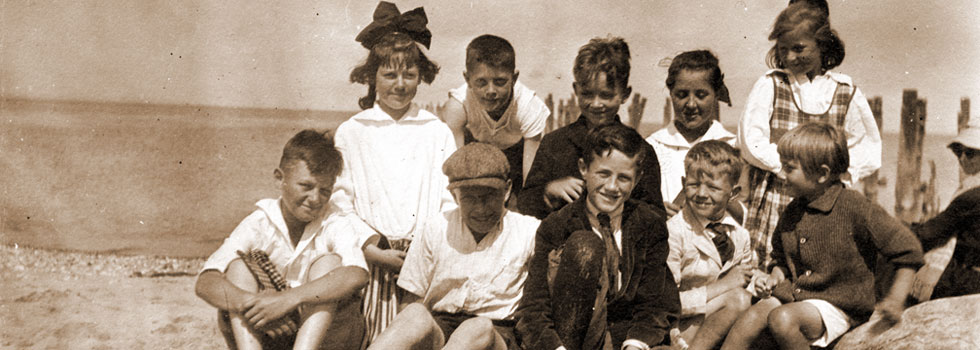
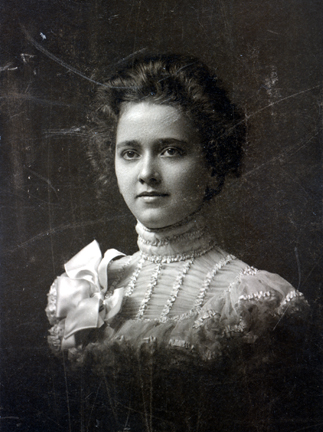
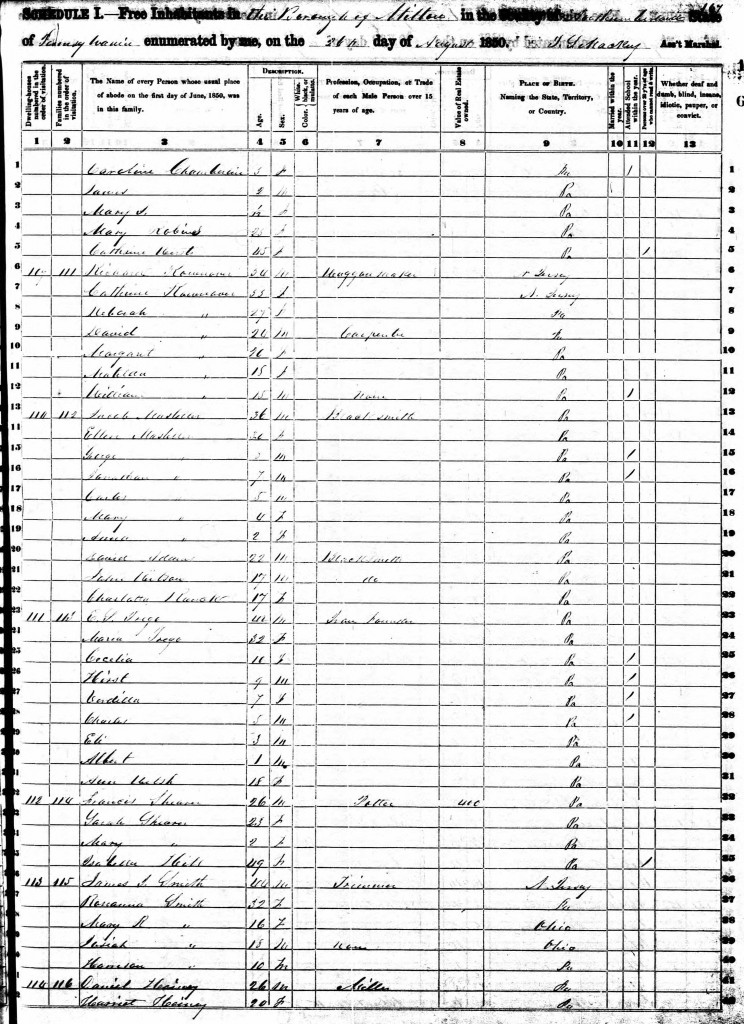
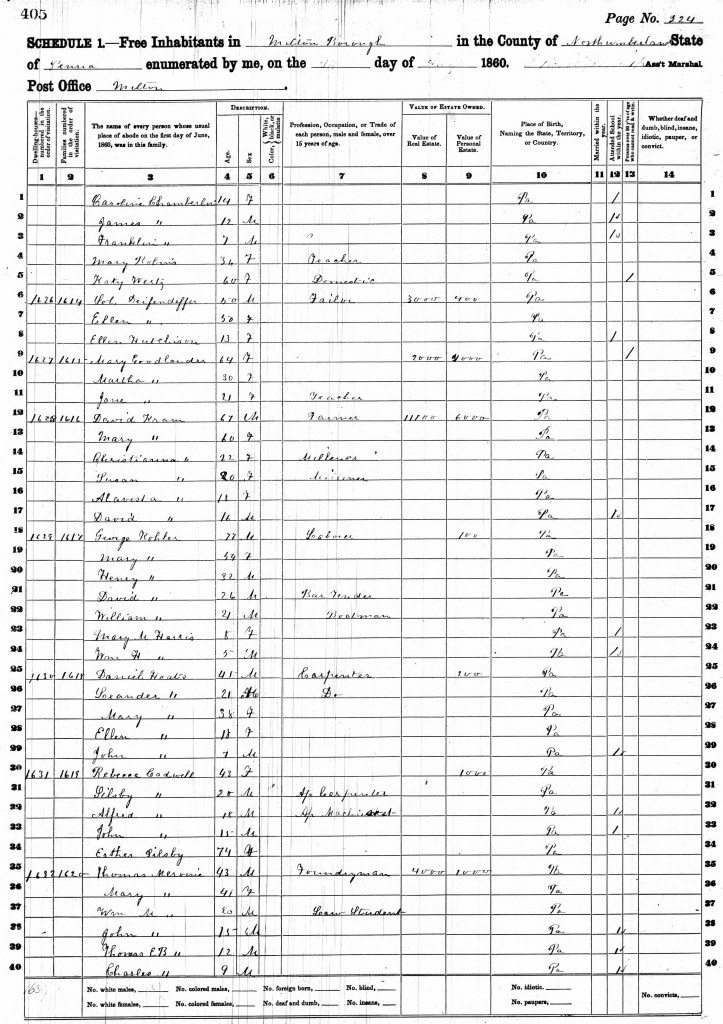
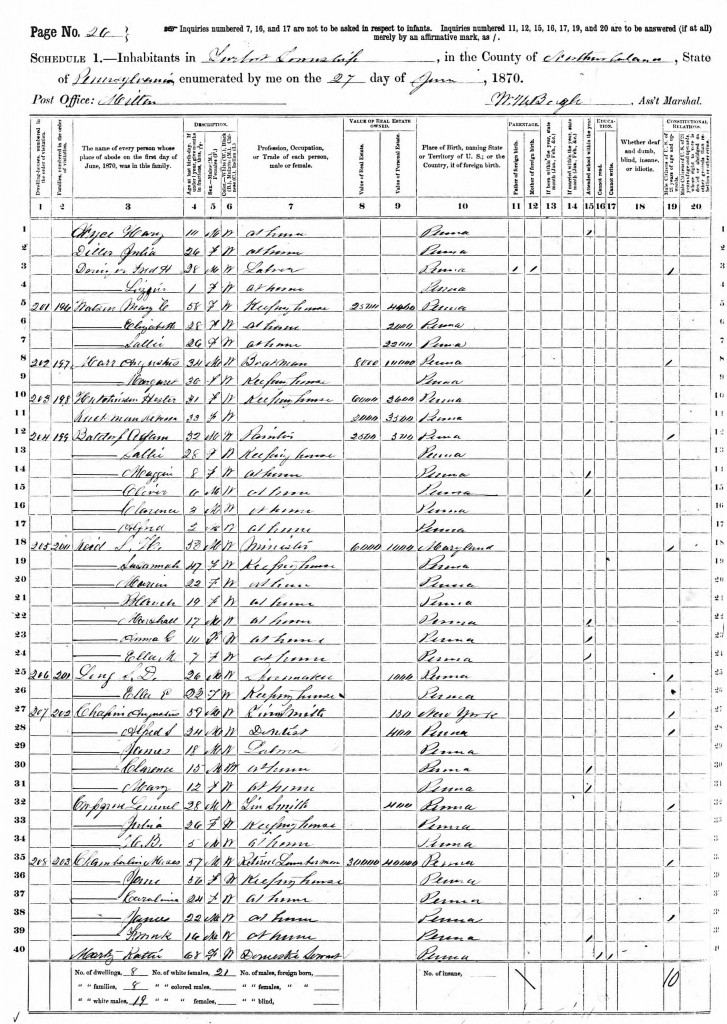
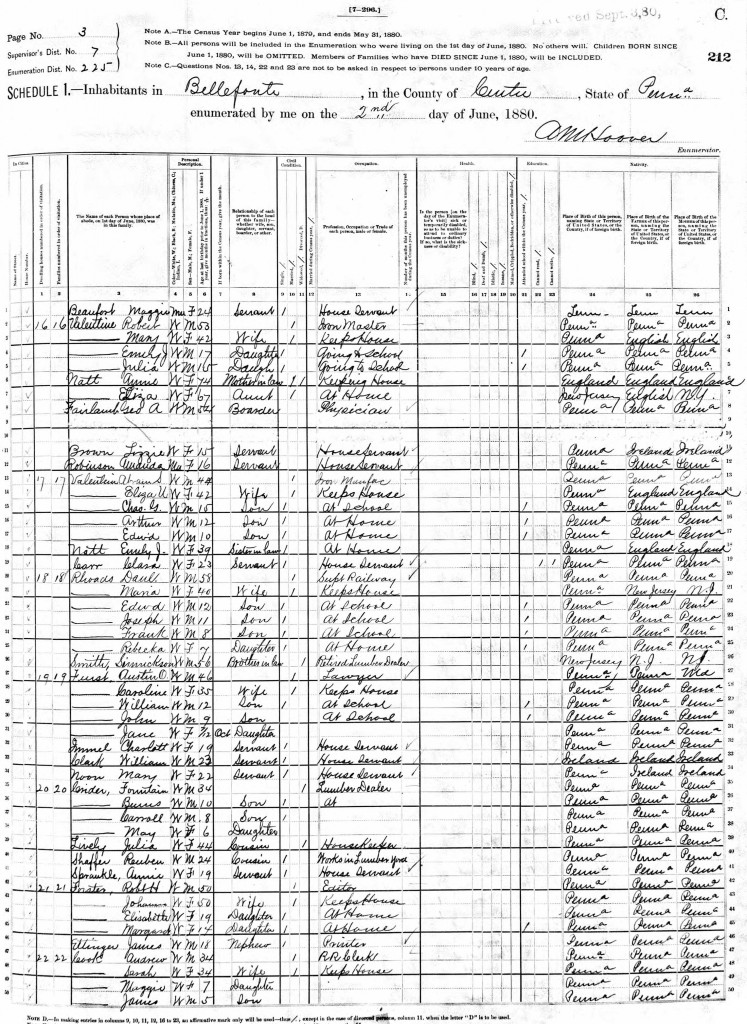
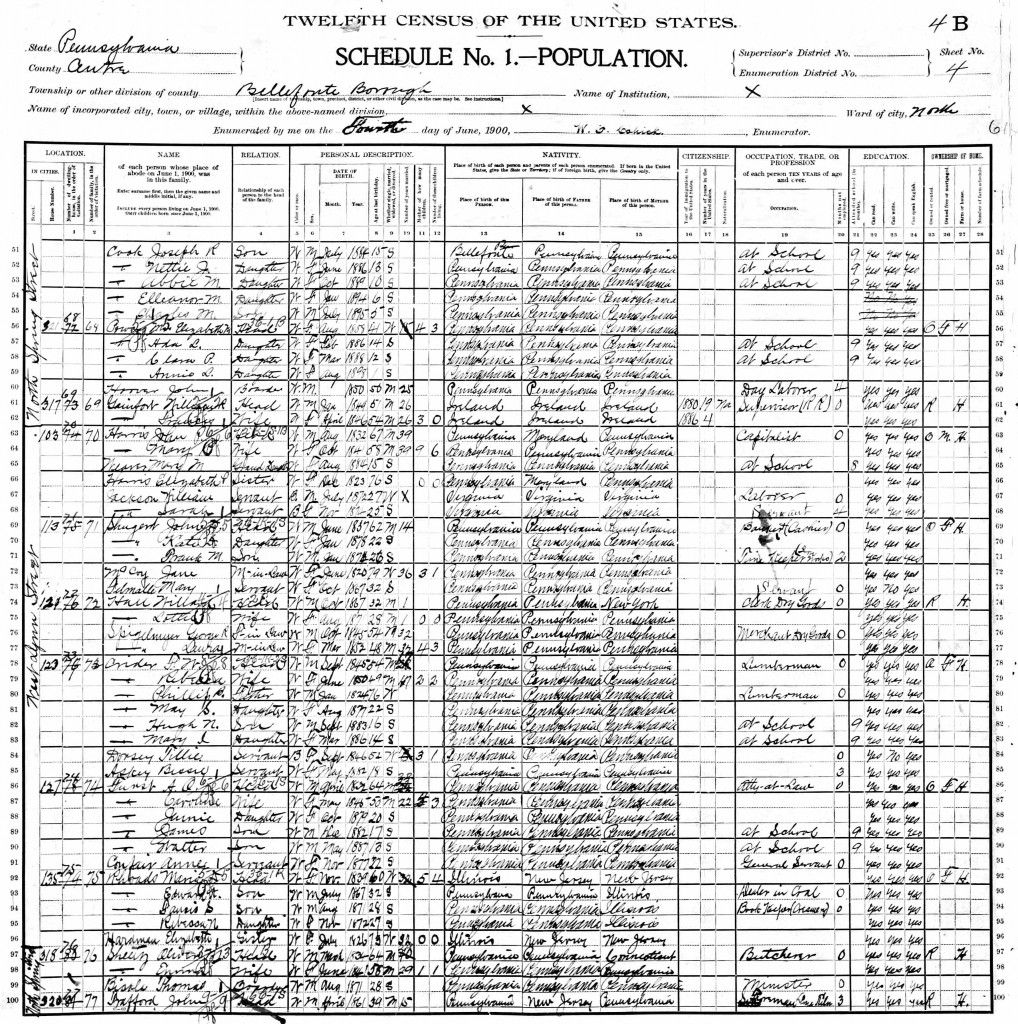
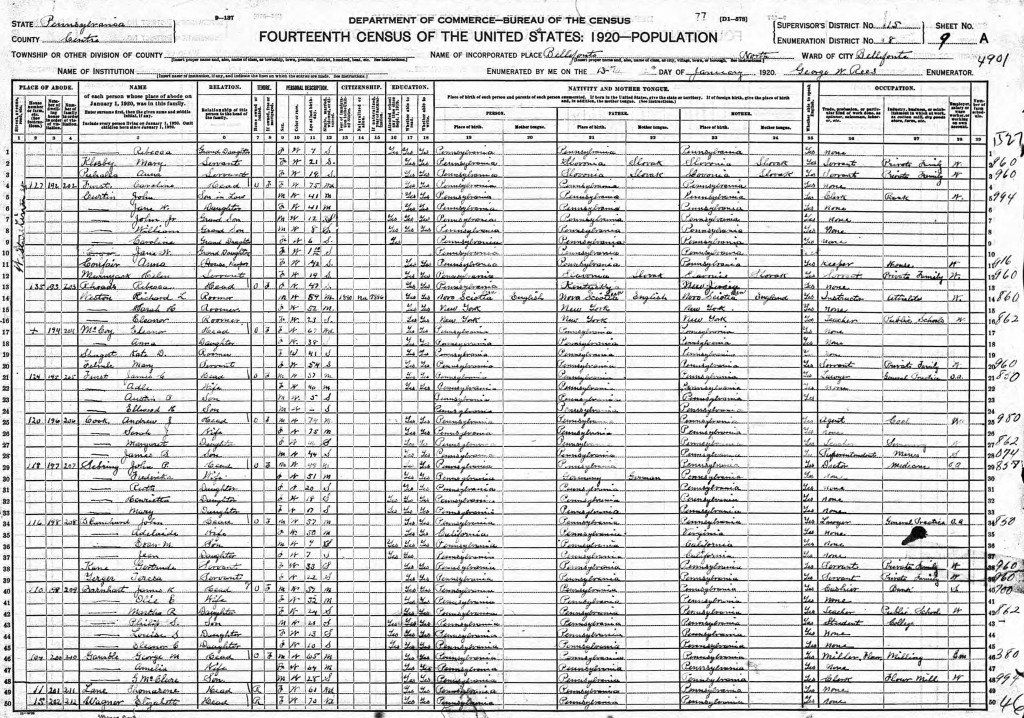
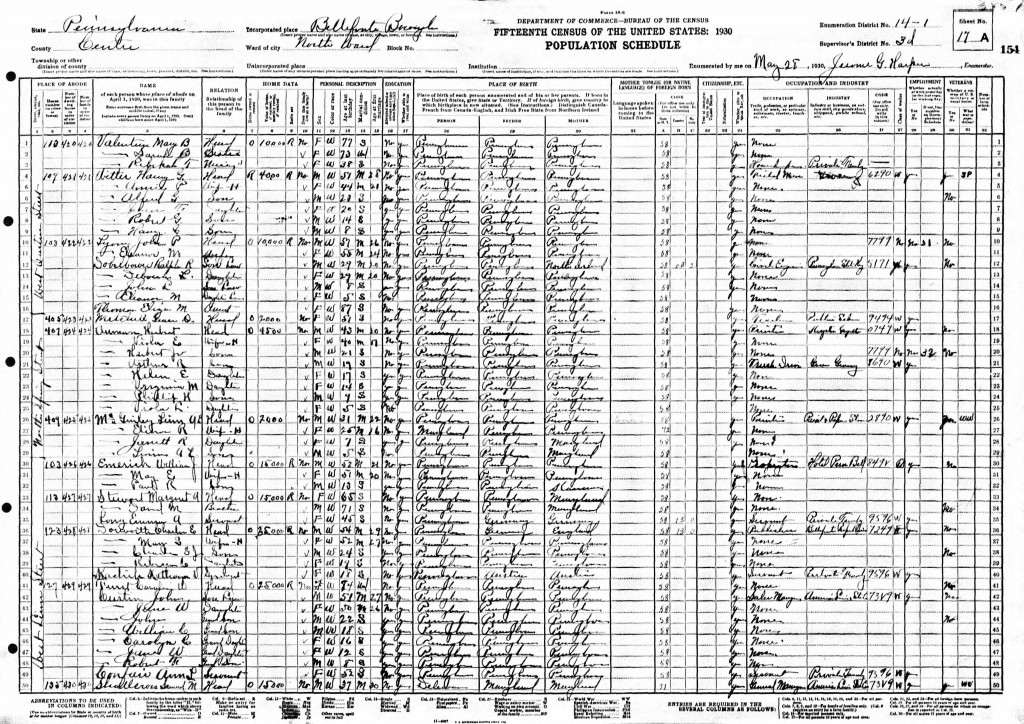
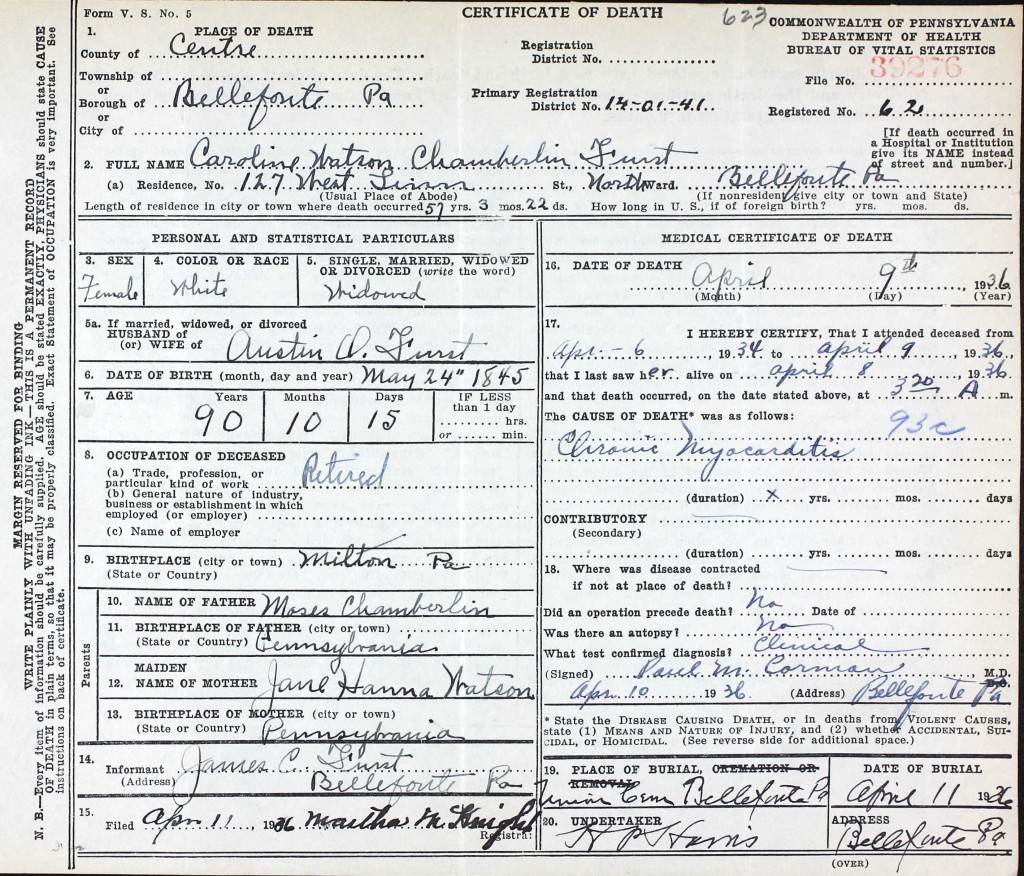
Hello Karen!
This is Sue Kellerman, Bellefonte Chapter DAR Historian. Hope to see you at our Saturday, April 11, 2015 event when the Chapter re-dedicates the plaque in honor of our founding Regent Caroline.
All the best,
Sue